Ubuntu Mobile switching to Qt?
January 22, 2009 Canonical may switch its Linux device stack from GNOME Mobile and the Hildon framework to Qt, says an industry report. The potential switch follows Nokia-owned Qt Software's announcement of a more flexible LGPL licensing option for its forthcoming Qt 4.5 release. (more…)
Canonical may switch its Linux device stack from GNOME Mobile and the Hildon framework to Qt, says an industry report. The potential switch follows Nokia-owned Qt Software's announcement of a more flexible LGPL licensing option for its forthcoming Qt 4.5 release. (more…)
 Some of the industry's top Linux luminaries will examine the state of embedded Linux on its tenth anniversary next week at the Real-Time & Embedded Computing Conference in Santa Clara, Calif.
Some of the industry's top Linux luminaries will examine the state of embedded Linux on its tenth anniversary next week at the Real-Time & Embedded Computing Conference in Santa Clara, Calif.  Mobile veteran Jason Whitmire (pictured) has written an editorial previewing the Mobile World Congress in Barcelona. Whitmire, who is Wind River's GM of Mobile Solutions, says the show will be more Linux- and open-source flavored than ever, with LiMo, Android, and Moblin all vying for attention.
Mobile veteran Jason Whitmire (pictured) has written an editorial previewing the Mobile World Congress in Barcelona. Whitmire, who is Wind River's GM of Mobile Solutions, says the show will be more Linux- and open-source flavored than ever, with LiMo, Android, and Moblin all vying for attention. 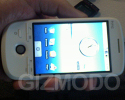 Images have surfaced of a keyboard-less “G2” Android phone reportedly being readied by HTC. Meanwhile, T-Mobile announced a G1 rollout in Europe, Kogan's Android-based Agora smartphone has been postponed, and Android is gaining a “Cupcake” update and key retrieval system, while losing a core developer.
Images have surfaced of a keyboard-less “G2” Android phone reportedly being readied by HTC. Meanwhile, T-Mobile announced a G1 rollout in Europe, Kogan's Android-based Agora smartphone has been postponed, and Android is gaining a “Cupcake” update and key retrieval system, while losing a core developer.  Brazilian independent software vendor (ISV) Handcase says it is porting about 100 of its PalmOS applications to the Linux-based WebOS platform set to debut in Palm's forthcoming Pre smartphone.
Brazilian independent software vendor (ISV) Handcase says it is porting about 100 of its PalmOS applications to the Linux-based WebOS platform set to debut in Palm's forthcoming Pre smartphone.  A mobile technology conference co-located with OpenSource World (formerly “LinuxWorld”) is soliciting paper proposals. The Mobile Conference at OpenSource World, Aug. 10-13 in San Francisco, seeks papers on Android, LiMo, Maemo, Moblin, OpenMoko, Open SymbianOS, Microsoft Shared Source, Java, and…
A mobile technology conference co-located with OpenSource World (formerly “LinuxWorld”) is soliciting paper proposals. The Mobile Conference at OpenSource World, Aug. 10-13 in San Francisco, seeks papers on Android, LiMo, Maemo, Moblin, OpenMoko, Open SymbianOS, Microsoft Shared Source, Java, and… 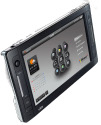 Korean manufacturer Yukyung unveiled a large mobile Internet device (MID) equipped with an Intel Atom Silverthorne Z520 running Linux at 1.33GHz. The Viliv X70 Communications MID is equipped with a 7-inch, 1024×600 touchscreen, GPS, Bluetooth, WiFi, WiMAX, HDSPA, and even a hard drive.
Korean manufacturer Yukyung unveiled a large mobile Internet device (MID) equipped with an Intel Atom Silverthorne Z520 running Linux at 1.33GHz. The Viliv X70 Communications MID is equipped with a 7-inch, 1024×600 touchscreen, GPS, Bluetooth, WiFi, WiMAX, HDSPA, and even a hard drive.  The Open Source Automation Development Lab (OSADL) announced that it is integrating the Real-Time Linux Foundation (RTLF) within its organization. The OSADL also announced a call for papers for the RTLF's 11th-annual Real Time Linux Workshop, to be held on September 28-30, in Dresden,…
The Open Source Automation Development Lab (OSADL) announced that it is integrating the Real-Time Linux Foundation (RTLF) within its organization. The OSADL also announced a call for papers for the RTLF's 11th-annual Real Time Linux Workshop, to be held on September 28-30, in Dresden,…  Rugged handheld specialist AML has unveiled a Linux and Windows CE-ready PDA targeting retail and hospitality applications, entertainment venues, and trade show events. Boasting a far larger battery than most laptops, the AML M8050 has a built-in MSR (magnetic stripe reader), WiFi, and barcode scanner.
Rugged handheld specialist AML has unveiled a Linux and Windows CE-ready PDA targeting retail and hospitality applications, entertainment venues, and trade show events. Boasting a far larger battery than most laptops, the AML M8050 has a built-in MSR (magnetic stripe reader), WiFi, and barcode scanner. 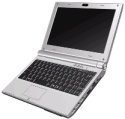 CherryPal announced an Atom-based “Bing” netbook that runs Linux or Windows XP, and offers a claimed five hours of battery life. The company also announced an upgraded version of its Linux-based nettop, the CherryPal C114, and launched a “Green Maraschino” open-source Linux distribution supporting the Bing.
CherryPal announced an Atom-based “Bing” netbook that runs Linux or Windows XP, and offers a claimed five hours of battery life. The company also announced an upgraded version of its Linux-based nettop, the CherryPal C114, and launched a “Green Maraschino” open-source Linux distribution supporting the Bing.  Technology blog site TechCrunch has prototyped a WiFi-enabled tablet PC device that runs Linux. The “Crunchpad” is equipped with a Via Nano processor, 1GB RAM, 4GB flash, and a 12-inch, 1024×768 touchscreen, and appears to be aimed at Web-curious couch potatoes.
Technology blog site TechCrunch has prototyped a WiFi-enabled tablet PC device that runs Linux. The “Crunchpad” is equipped with a Via Nano processor, 1GB RAM, 4GB flash, and a 12-inch, 1024×768 touchscreen, and appears to be aimed at Web-curious couch potatoes. 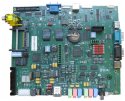 Raza (RMI) announced a line of MIPS32-based SoCs for portable and low-powered multimedia devices. Sampling with a development board and Linux or Windows CE BSPs, the Au1300 SoCs will clock to 1GHz, and use half a Watt to decode 720p video, the company says.
Raza (RMI) announced a line of MIPS32-based SoCs for portable and low-powered multimedia devices. Sampling with a development board and Linux or Windows CE BSPs, the Au1300 SoCs will clock to 1GHz, and use half a Watt to decode 720p video, the company says.  Telit is shipping a multi-chip module (MCM) integrating an ARM-powered baseband processor and RF module, together with a 200MHz ARM9-based Atmel AT91SAM9260 application processor supported by 4MB of flash and 64MB of RAM.
Telit is shipping a multi-chip module (MCM) integrating an ARM-powered baseband processor and RF module, together with a 200MHz ARM9-based Atmel AT91SAM9260 application processor supported by 4MB of flash and 64MB of RAM. 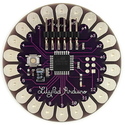 The Arduino Project has published a new “open,” Atmel-based microcontroller (MCU) module design, called the Duemilanove. Meanwhile, mesh-networking gear vendor Libelium, which uses Arduino designs in some products, has launched its second-annual contest for the “coolest” project based on an Arduino…
The Arduino Project has published a new “open,” Atmel-based microcontroller (MCU) module design, called the Duemilanove. Meanwhile, mesh-networking gear vendor Libelium, which uses Arduino designs in some products, has launched its second-annual contest for the “coolest” project based on an Arduino…